![$rows[judul]](http://iycw-aspac.org/asset/foto_berita/ycwthailand2025.jpg)
With gratitude and
faith, we, the Young Christian Workers (YCW) of the Asia-Pacific region,
continue our journey to rebuild and strengthen our movement in Thailand. Guided
by the spirit of Joseph Cardijn, we strive to reach out to young workers,
discover their realities, and help them act for dignity, justice, and
solidarity.
From September 7 to
October 5, 2025, the IYCW-ASPAC team carried out its fourth field visit to
Thailand. This mission aimed to deepen the organizing work, reinforce the
foundation of YCW Thailand, and prepare its leaders to participate meaningfully
in the 2026 International Council in the Philippines.
We came with
enthusiasm and left with renewed confidence that the movement is slowly but
surely taking root again growing from the lives and struggles of young Thai
workers who long for change and solidarity.
Laying the Groundwork for YCW Thailand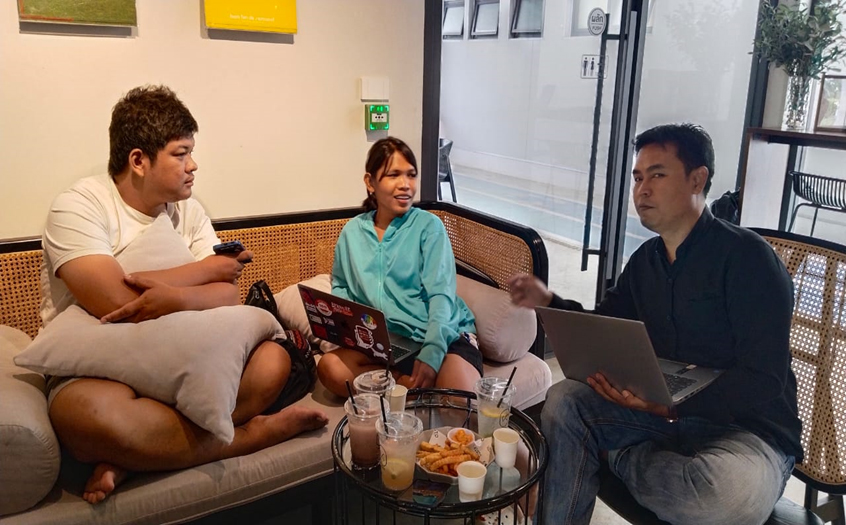
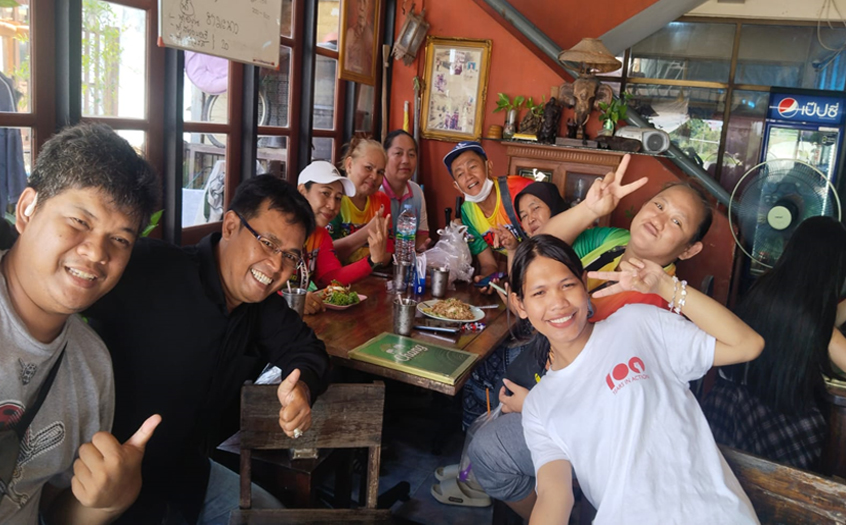
The visit began with
reconnecting with local leaders who have been part of the rebuilding process.
Through meetings and reflection sessions, we saw the growth in their commitment
and understanding of YCW’s vision.
One of the mission’s
main achievements was the formation of a National Coordination Team, a vital
structure for strengthening internal organization and linking local work to the
regional and international levels. The team adopted the name ACT Young Club
(AYC), which now serves as the official identity of YCW Thailand.
To enhance
communication and visibility, AYC has created an email address
(actyoungclub@gmail.com) and official Facebook and Instagram pages, making it
easier to reach young workers, former members, and partners.
The team also prepared an initial action plan for 2026, which
includes:
This plan gives direction and focuses to their organizing work in the
coming year, rooted in the YCW method of See–Judge–Act.
A Testimony of Hope and Global Solidarity
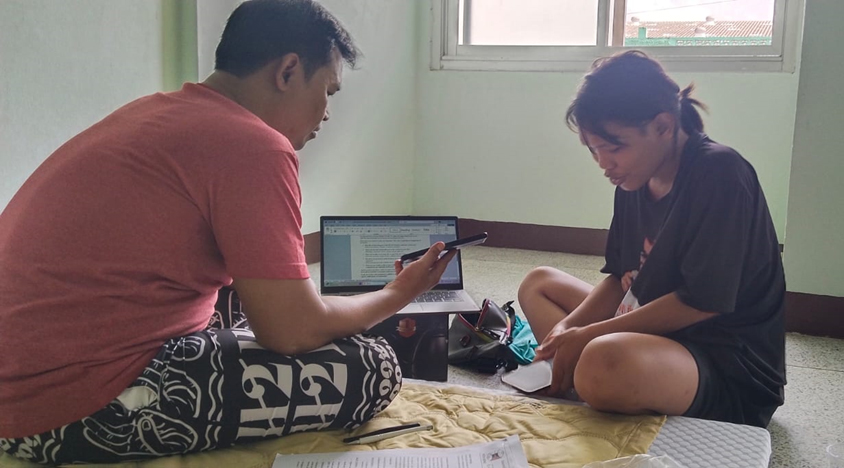 A special moment
during our mission was hearing the testimony of Duangsompong “Toey” Wanglap, a
young Thai worker who represented YCW Thailand at the YCW Centenary Celebration
in Belgium and the International Labour Organization (ILO) Conference in Geneva
earlier in 2025.
A special moment
during our mission was hearing the testimony of Duangsompong “Toey” Wanglap, a
young Thai worker who represented YCW Thailand at the YCW Centenary Celebration
in Belgium and the International Labour Organization (ILO) Conference in Geneva
earlier in 2025.
Toey described the
Centenary as “a joyful and inspiring experience,” where she met young workers
from different continents and learned about YCW’s global history. Visiting the
Cardijn Museum helped her understand how deeply the movement’s roots run.
“At the Centenary, I
realized we are not alone,” Toey said. “Many young workers around the world
face the same struggles—low wages, job insecurity, discrimination—but they
continue to organize. That gives me hope to rebuild YCW here in Thailand.”
At the ILO Conference,
she observed how governments, employers, and trade unions interact in shaping
labor policies. “Many unions there are close to government or employers,” she
noted. “We need movements like YCW to raise the true voice of young and
informal workers.”
Her story reminded
everyone that even small movements can make a global impact when they are
rooted in people’s realities and guided by faith.
Reconnecting with Former Members: Continuity and Support
Rebuilding YCW
Thailand also means reconnecting with its former leaders who once made the
movement strong. We met with Sripai, Rotsarin, Somyot, and Rungrote, who
generously shared their experiences from past organizing work.
They welcomed the team
with enthusiasm and expressed willingness to support the new
generation—offering help in education, coordination, and even spaces for
meetings. Their stories of organizing factory workers decades ago reminded us
of the YCW’s important role in Thailand’s labor history.
But they also pointed
out that organizing factory workers today has become more difficult due to age,
fear, and job insecurity. However, they encouraged focusing on informal,
service, and migrant workers, where new opportunities for organizing exist.
“If we start with
young informal and migrant workers,” one former leader said, “we can rebuild
YCW with new energy and relevance.”
Their insight helped
the coordination team reflect on how to adapt to current realities while
keeping the spirit of genuine workers’ education alive.
Seeing the Realities of Young Workers
We visited several groups of workers—cleaning service workers, massage therapists, and migrant workers—to better understand their daily struggles. Many expressed the same concerns: low and unstable wages, long working hours, lack of social protection, and fear of retaliation for speaking out.
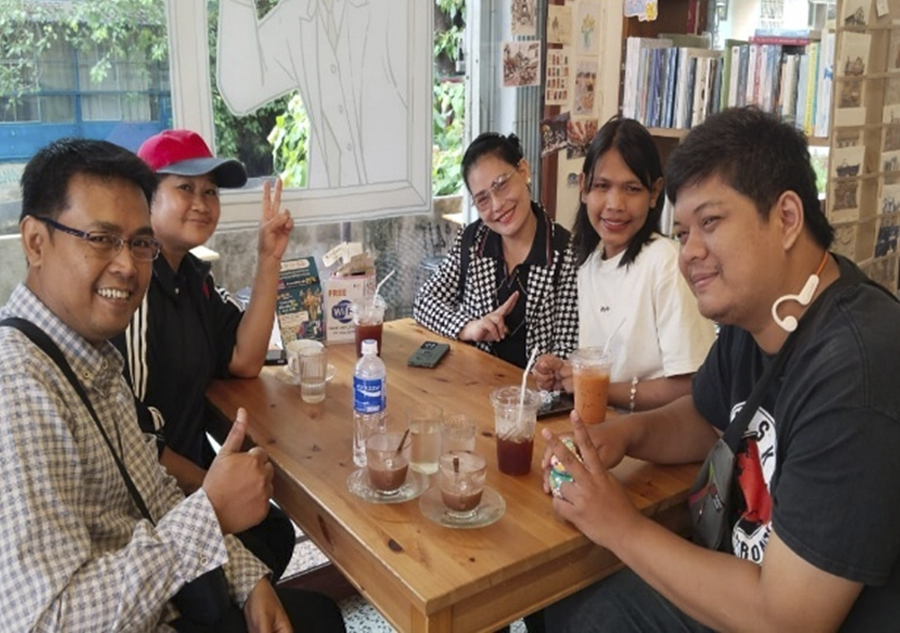
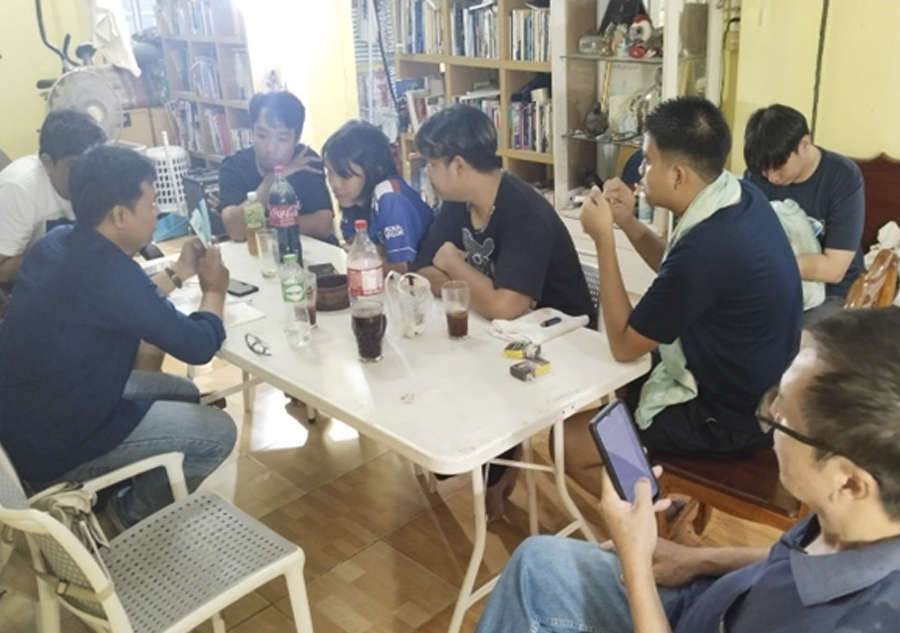
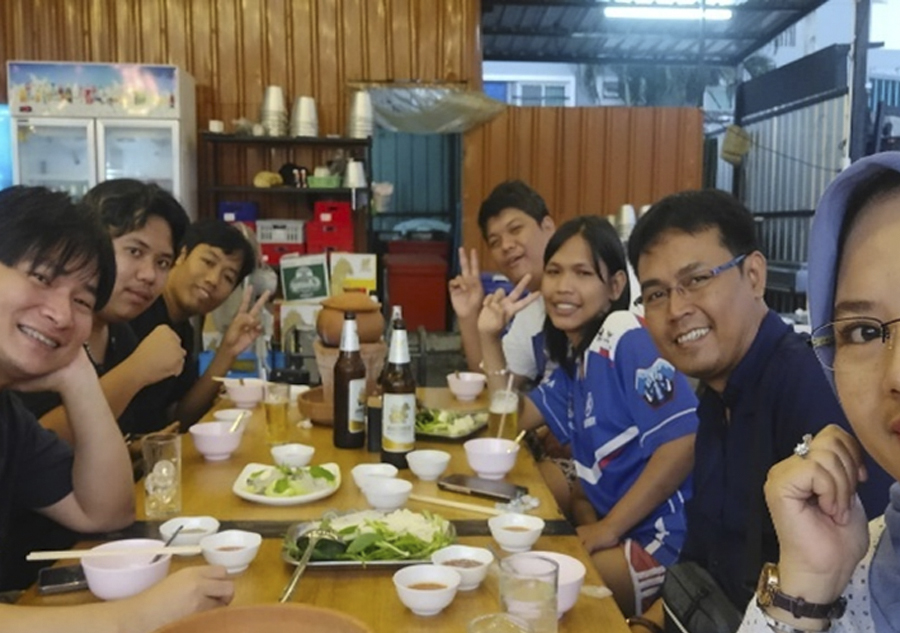
Some workers from
Myanmar and Cambodia shared experiences of discrimination and unfair treatment.
Despite these challenges, they expressed a strong sense of solidarity and hope
for improvement.
For YCW Thailand,
these encounters were eye-opening. Listening to workers’ testimonies is the
first step to understanding their reality and building collective action. The
coordination team now plans to return to these groups for See–Judge–Act
sessions and possible base group formation.
Partnerships for Broader Change
Partnership and collaboration have been key to strengthening the movement. During this visit, we met with the Thailand Foundation for LGBTQ+, where discussions centered on gender equality, workers’ rights, and combating sexual harassment. Both groups saw opportunities to collaborate on education programs promoting inclusivity and dignity in the workplace.
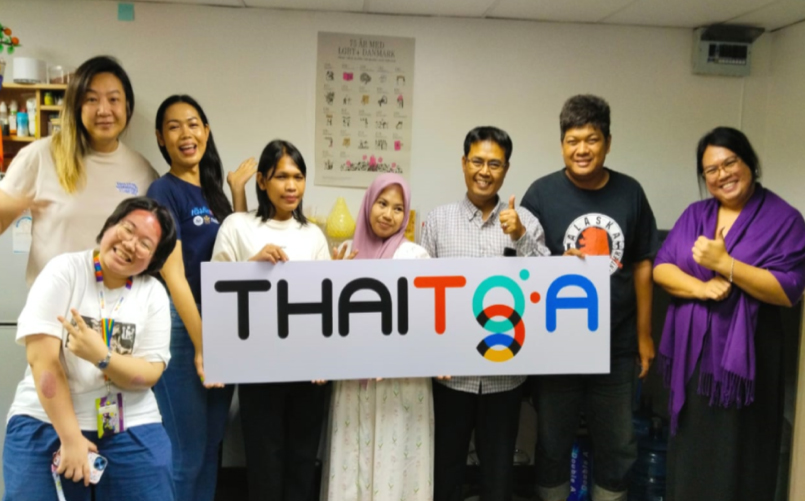
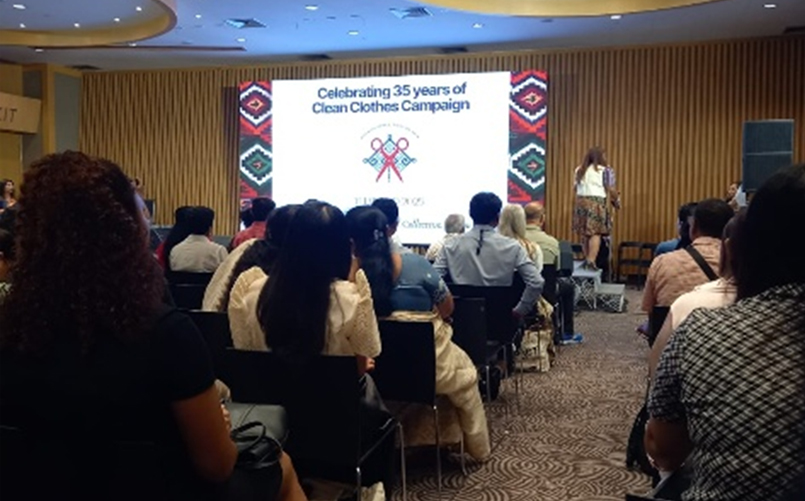
We also joined the
35th Anniversary Celebration of the Clean Clothes Campaign (CCC) in Bangkok,
which brought together garment workers, unions, and NGOs from across Asia.
Participants included union leaders from Indonesia (KASBI, SBSI GARTEK, SPN),
and representatives from Malaysia’s Tenaganita, WRC South Asia, HomeNet South
Asia, and Norwegian People’s Aid.
The event strengthened
our regional solidarity and reaffirmed YCW’s commitment to workers’ rights. One
meaningful encounter was with Thiruvarual from India, a former IYCW Secretariat
member now with CCC in Belgium. He expressed his optimism about collaboration
between YCW and CCC, particularly in supporting garment workers’ campaigns.
Such partnerships are vital for ensuring that young workers in Thailand are connected to the broader movement for decent work and social justice in Asia and beyond.
Formation and Education: The Heart of the Movement
Education remains the
soul of the YCW. During this visit, we held several formation sessions
introducing YCW’s vision, mission, and methodology. Participants studied the
key documents—the Declaration of Principles (DOP), Task of Education (TOE), and
Review of Life and Work Analysis (ROLWA)—and reflected on how these can guide
their organizing work.
Though time was
limited, the sessions sparked enthusiasm. Members expressed the desire to
continue learning and sharing experiences regularly. To support this, the ASPAC
team and YCW Thailand agreed to hold monthly online follow-ups for continued
accompaniment.
Former YCW members
also committed to helping with formation and mentoring, bridging the movement’s
past and present. Their involvement strengthens the foundation for a new
generation of leaders who will carry the mission forward.
Challenges and the Road Ahead
Rebuilding YCW
Thailand remains a long and demanding journey. Among the main challenges are:
Yet, in every challenge,
there are signs of hope. The commitment of young leaders, the guidance of
former members, and the solidarity of partners across Asia and the world keep
the spirit alive.
Every meeting,
discussion, and reflection contributes to rebuilding a sense of collective
power. We are reminded of Cardinal Cardijn’s words: “Each young worker is
worth more than all the gold in the world.” That truth continues to inspire
our mission.
Towards 2026: A Movement Reborn
As YCW Thailand
prepares for the International Council in 2026, hope fills the hearts of
the members. Their participation will mark a milestone in reconnecting Thailand
with the global YCW community.
We dream of seeing
young Thai workers once again sharing their stories and struggles with fellow
YCW members worldwide. Their voices—shaped by courage, faith, and
resilience—will contribute to the collective vision of a just and humane world
of work.
Rebuilding YCW
Thailand is more than restoring an organization; it is reviving a vision
where young workers recognize their dignity, organize for their rights, and
live their faith through action. The foundation has been laid. The spirit is
alive. With support from the regional team, mentors, and partners, YCW Thailand
is finding its voice again.
Faith in Action: The Journey Continues
The story of YCW
Thailand is one of resilience and renewal. It shows that even when movements
face decline, the seeds of hope remain. Through commitment, solidarity, and
faith, these seeds can grow again.
As we conclude this
mission, we carry the stories and smiles of the young Thai workers we met—their
courage, their struggles, and their hope for a better future. They are the
reason we continue.
In the words of our
founder, Cardinal Joseph Cardijn, we are called to “See, Judge, and Act.”
This is the path we continue to follow in Thailand, across Asia, and around the
world.
With faith and
determination, we move forward—rebuilding the movement, renewing our mission,
and strengthening solidarity among young workers everywhere.
The movement is alive.
The spirit is strong. Together, we are rebuilding the YCW in Thailand.
Write comment